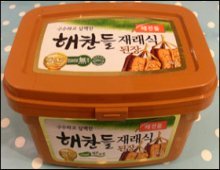|
Korean Soy Bean Paste
So, What Makes Traditionally Produced Doenjang Different? All Korean companies producing doenjang rely upon either traditional or modified meju as a foundation for the product. Meju is a brick of fermented soybeans that acts as the base for doenjang production. Traditional meju is typically not produced in mass quantities as it is for the commercial production of soy bean paste. Family-based production never is accompanied by the monitoring of the fermenting process as it is in commercially produced products. However, this does not mean that traditionally produced doenjang carries with it safety concerns. Furthermore, unlike its Japanese counterpart Miso, traditional doenjang contains no rice, only beans. Miso contains both. The fact doenjang has higher protein levels may contribute to its health benefits. Miso may have a lighter taste more appealing to younger people, children and consumers unfamiliar with Korean cuisine. However, doenjang does hearken to a time when Korean mothers took the time to produce this tasty condiment used with stews and soups as well as a favourite choice for flavouring vegetables. An Essential Korean Sauce For centuries, doenjang has been at the centre of seasoning in all Korean home kitchens, but was not well-known beyond the Korean peninsula until a spate of international food articles started revealing its use and thus increasing its popularity. It contains no artificial additives and its potential health-producing benefit has been indicating it may help prolong life. In a specific part of Korea - Sunching - where doenjang is readily produced and consumed as well, out of 32,000 residents, eight people are older than 100 and many are older than 90. Popular Uses Soy bean paste often is used as a vegetable dip like Westerners use with celery and carrot sticks. However, it’s more common uses are as a stock for soups or stews (jiggae) or when mixed with other ingredients like sesame oil and garlic or sometimes with gochujang, which produces ssamjang that is traditionally eaten with grilled meat wrapped in a vegetable leaf such as red lettuce. It is a basic sauce that Koreans use when eating Jeyuk Bokkeum, a popular dish comprised of pork belly meat that typically comes straight off the grill to the table for immediate consumption. Doenjang Presents Several Health Benefits This is one tasty condiment that, according to the Korea Food Research Institute, can also provide consumers with some beneficial health benefits. In fact, the research conducted at the institute has found that doenjang can inhibit cancer cell growth during in vitro testing. In a research paper published by Institute scientists Jung Keun-ok, Park Su-young and Park Kun-young (Nutrition, May 2006) stated longer aged doenjang has increased anti-cancer and anti-metastatic properties. Also, doenjang fermented for more than two years showed significant anti-tumor inhibition than similar paste fermented for three to six months. Tests on 32 varieties of doenjang paste revealed that not only did longer-aged paste provide health benefits, but the condiment fermented for two-to-three years is also much tastier. |
 Korean fermented Soy bean paste is a Korean sauce made from dried soybeans, Enjoyed throughout Korea and used mainly as a stock for miso soup. It can be bought from most Asian supermarkets and comes in a brown box. South Koreans refer to this sauce as Deonjang.
Korean fermented Soy bean paste is a Korean sauce made from dried soybeans, Enjoyed throughout Korea and used mainly as a stock for miso soup. It can be bought from most Asian supermarkets and comes in a brown box. South Koreans refer to this sauce as Deonjang.